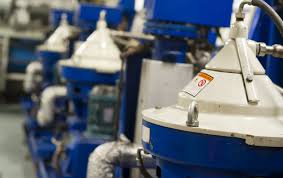The function of a ship purifier is to separate unwanted impurities from liquids, most commonly from fuel oil or lubricating oil, which are critical for the operation of the ship’s engines and machinery. This purification is necessary to ensure the proper functioning and longevity of the engine and machinery, as well as to meet environmental standards.
Here are the key functions of a ship purifier:

1. Removal of Contaminants (Impurities):
- Fuel Purifier: The primary function of a fuel oil purifier is to separate water and solid contaminants (such as sludge, rust, dirt, or debris) from fuel oil. Contaminated fuel can cause damage to the engine, resulting in poor performance, clogged filters, or even engine failure.
- Lubricating Oil Purifier: Similar to the fuel purifier, a lubricating oil purifier removes water, metal particles, and carbonized oil residues that accumulate over time due to engine wear.
2. Ensure Proper Fuel Quality:
- Ships typically use heavy fuel oils, which contain a significant amount of impurities. The purifier removes these contaminants to ensure that the fuel meets the required standards for efficient combustion in the engine. This process helps in maintaining combustion efficiency and reduces the formation of soot.
3. Prevent Engine and Machinery Damage:
- Contaminated fuel or lubricating oil can cause corrosion, clogging, and wear to the engine parts, which can lead to engine breakdowns. A purifier helps in preventing such issues by cleaning the fuel or oil before it reaches the engine.
4. Maintain Operational Efficiency:
- By ensuring that only clean fuel or oil is used in the engine, the purifier contributes to smooth engine operation. Clean fuel ensures that the engine runs at optimal performance, minimizing the risk of irregular fuel flow, loss of power, or inefficient fuel combustion.
5. Compliance with Environmental Standards:
- Many ships are subject to IMO (International Maritime Organization) regulations that limit the sulfur content in fuel oils and mandate proper waste management. The purifier helps meet these standards by improving fuel quality, which can help in reducing harmful emissions like sulfur oxides (SOx) and particulate matter.
6. Separation of Water:
- Water in fuel can be detrimental to engines and boilers, as it can cause rusting, corrosion, and improper combustion. The purifier removes free water from the fuel oil by using centrifugal force to separate it based on different densities.
7. Handling of Waste:
- After the separation process, the purifier collects the sludge and separated water, which needs to be disposed of properly according to maritime waste disposal regulations. The waste is typically sent to a sludge tank or oil-water separator for further treatment.
8. Extend the Service Life of Filters:
- By removing impurities before the fuel enters the engine, the purifier reduces the burden on secondary filters, thus extending their lifespan and improving overall fuel system reliability.
Types of Ship Purifiers:
- Centrifugal Purifier: This is the most common type, which uses centrifugal force to separate impurities from liquids based on their density differences.
- Water Separators: Specialized purifiers that focus primarily on removing water from fuel oil.
By performing these tasks, a ship purifier helps improve operational efficiency, reduces maintenance costs, and ensures compliance with environmental standards.
If you need more details on specific purifier systems or how they work in different types of machinery on board, let me know!

